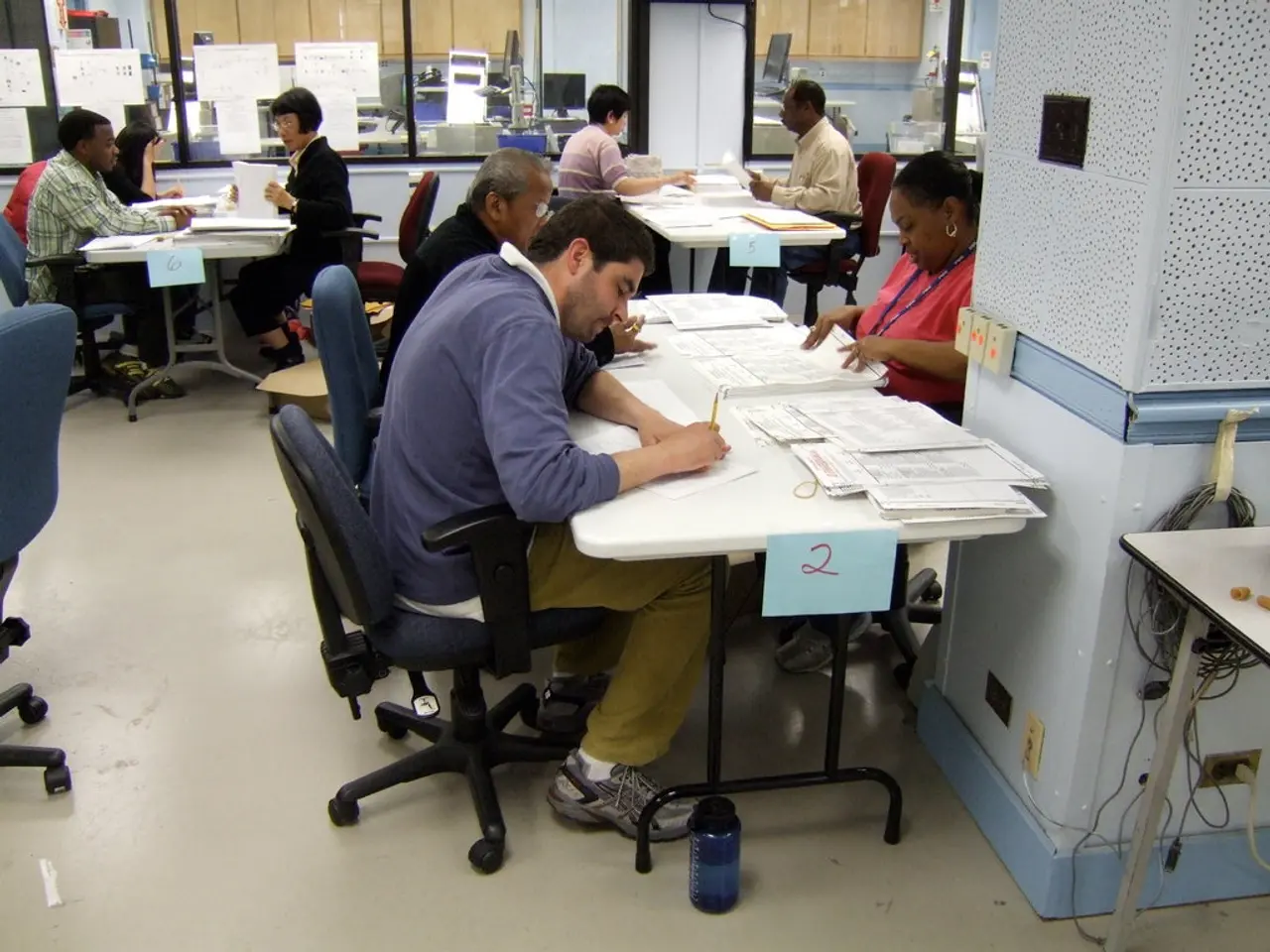Study-Related Headaches: Causes and Avoidance Strategies
=============
Studying can be a challenging and stressful activity, especially for students. One common issue that many students face is headaches, which can make focusing on work even more difficult. Here are some factors that contribute to headaches during study sessions and steps to prevent or manage them.
Common Causes of Headaches During Study Sessions
Headaches during study sessions can be caused by various factors such as dehydration, stress, insufficient or irregular sleep, hormonal fluctuations, nutritional deficiencies, and environmental factors like poor posture or eye strain. These factors can trigger tension-type headaches or migraines, which are often experienced while focusing or studying intensely [1][2][3][5].
Key Triggers and Contributing Factors
- Dehydration: Even mild dehydration reduces blood flow and oxygen to the brain, causing headaches [1][4].
- Stress: Emotional and mental stress alters brain chemicals (e.g., serotonin), triggering migraines or tension headaches. Both high stress and relaxation after stress (the "let-down" effect) can induce headaches [2][3][4].
- Sleep issues: Lack of sleep, oversleeping, or inconsistent sleep schedules disrupt brain chemistry, increasing headache risk [2][5].
- Hormonal fluctuations: Changes in hormones, such as during the menstrual cycle, can provoke headaches [1][2].
- Nutritional deficiencies: Deficiencies in magnesium, vitamin D, and B vitamins are linked to frequent headaches and migraines [1].
- Study-related physical strain: Poor ergonomics, eye strain from screens or reading, and tension in neck muscles during studying can cause headaches [5].
Steps to Prevent or Manage Headaches During Study Sessions
- Stay adequately hydrated by drinking enough water daily, around 2.7 to 3.7 liters for adults, adjusting for activity [1][4].
- Manage stress using relaxation techniques such as deep breathing, yoga, meditation, or spending time outdoors. Consistent stress management reduces headache frequency [2][3][4].
- Establish a regular, sufficient sleep schedule. Prioritize 7-9 hours of quality sleep to minimize headache risk [2][5].
- Maintain balanced nutrition, including adequate intake of magnesium, vitamin D, and B vitamins, which may reduce migraine frequency [1].
- Correct study ergonomics: Ensure good posture, appropriate lighting, take regular breaks, and limit screen time to reduce physical strain and eye fatigue [5].
- Track headache patterns with a diary to identify specific triggers related to study habits, sleep, diet, or menstrual cycle, helping develop personalized prevention strategies [4].
If headaches persist or worsen despite these measures, consulting a healthcare professional for evaluation and tailored treatment is advisable [1][4].
Additional Tips
- Prolonged screen exposure is linked with increased reports of headaches among Saudi health sciences students [6].
- Practicing mindfulness or other stress reduction techniques can help manage stress and prevent headaches [2][3][4].
- Chronic overuse of caffeine can cause migraine headaches [7].
- Drinking coffee and other caffeinated drinks should be done in moderation to prevent headaches [8].
- Taking frequent breaks can help reduce eyestrain while studying [5].
- Spending too much time in straining positions may cause tightening of the muscles in the back of the neck or scalp, leading to a headache [9].
- Maintaining good posture while studying can help reduce the risk of headaches [10].
If a person experiences symptoms such as pain on one or both sides of the head, throbbing or pulsating pain, sensitivity to lights and sounds, nausea and vomiting, they may be experiencing migraine headaches [11]. In such cases, it is best to contact a doctor for advice on managing headaches and to rule out possible medical causes.
References:
[1] American Migraine Foundation. (2020). What Are Migraines? https://americanmigrainefoundation.org/resource-library/what-are-migraines/
[2] Mayo Clinic. (2021). Tension headaches. https://www.mayoclinic.org/diseases-conditions/tension-headache/symptoms-causes/syc-20371532
[3] National Institute of Neurological Disorders and Stroke. (2020). Migraine Fact Sheet. https://www.ninds.nih.gov/Disorders/Patient-Caregiver-Education/Fact-Sheets/Migraine-Fact-Sheet
[4] National Sleep Foundation. (2019). Headaches and Sleep. https://www.sleepfoundation.org/articles/headaches-and-sleep
[5] Student Health 101. (2021). The Connection Between Screen Time and Headaches. https://studenthealth101.com/article/the-connection-between-screen-time-and-headaches/
[6] Al-Khateeb, M., Al-Shammari, A., Al-Shammari, A., & Al-Sayyari, A. (2019). Prevalence and predictors of headache among Saudi health sciences students. Journal of the Saudi Medical Association, 40(11), 1171-1176. https://doi.org/10.1016/j.jsma.2019.06.008
[7] National Headache Foundation. (2020). Caffeine and Headache. https://www.headaches.org/2020/06/caffeine-and-headache/
[8] Mayo Clinic. (2018). Caffeine: How much is too much? https://www.mayoclinic.org/healthy-lifestyle/nutrition-and-healthy-eating/in-depth/caffeine/art-20048389
[9] American Migraine Foundation. (2020). Computer Vision Syndrome. https://americanmigrainefoundation.org/resource-library/computer-vision-syndrome/
[10] Student Health 101. (2021). The Connection Between Posture and Headaches. https://studenthealth101.com/article/the-connection-between-posture-and-headaches/
[11] Mayo Clinic. (2021). Migraine symptoms. https://www.mayoclinic.org/diseases-conditions/migraine-headache/symptoms-causes/syc-20353690
- Poor posture during study sessions, eye strain from screens or reading, and tension in neck muscles can cause headaches due to study-related physical strain.
- Insufficient or irregular sleep, and hormonal fluctuations, such as during the menstrual cycle, can provoke headaches among students.
- Nutritional deficiencies in magnesium, vitamin D, and B vitamins are linked to frequent headaches and migraines, which are often experienced while focusing or studying intensely.
- Dehydration, which reduces blood flow and oxygen to the brain, can also cause headaches during study sessions.
- Stress, emotional or mental, alters brain chemicals, triggering migraines or tension headaches.
- Maintaining good mental health, which is part of health-and-wellness, along with fitness-and-exercise routines, can help reduce stress levels and thereby prevent headaches. Additionally, practicing mindfulness and stress reduction techniques can aid in managing stress and preventing headaches.




